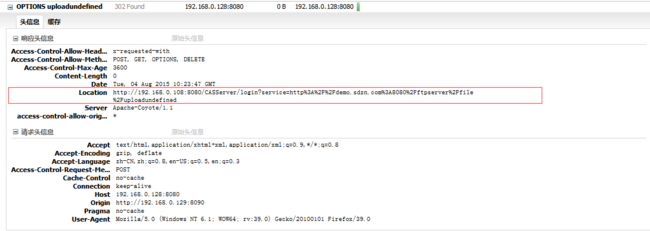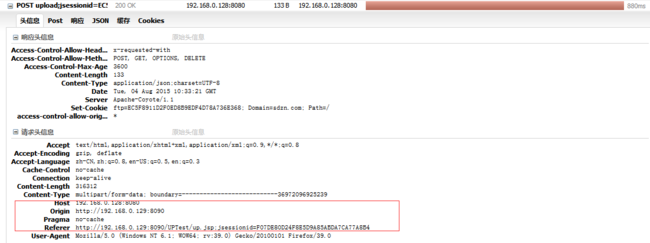CAS环境下的AJAX跨域
情况说明:
在单点登录的环境下,所有的文件上传都是通过webuploader上传到文件管理服务器。而webuploader的上传可以参考ajax的请求,相当于是跨域操作。
首先,跨域请求访问的问题,可以通过在文件服务器增加拦截器,修改请求头来解决。
package com.sdzn.util;
import java.io.IOException;
import javax.servlet.Filter;
import javax.servlet.FilterChain;
import javax.servlet.FilterConfig;
import javax.servlet.ServletException;
import javax.servlet.ServletRequest;
import javax.servlet.ServletResponse;
import javax.servlet.http.HttpServletResponse;
public class SimpleCORSFilter implements Filter {
public void doFilter(ServletRequest req, ServletResponse res,
FilterChain chain) throws IOException, ServletException {
HttpServletResponse response = (HttpServletResponse) res;
response.setHeader("Access-Control-Allow-Origin", "*");
response.setHeader("Access-Control-Allow-Methods",
"POST, GET, OPTIONS, DELETE");
response.setHeader("Access-Control-Max-Age", "3600");
response.setHeader("Access-Control-Allow-Headers", "x-requested-with");
chain.doFilter(req, res);
}
public void init(FilterConfig filterConfig) {
}
public void destroy() {
}
}
而在CAS的环境下,跨域的请求还会面临登录验证的重定向,但是ajax是不支持重定向的,进而导致文件上传的不成功。
查阅众多资料,最后在看到org.jasig.cas.client.authentication.AuthenticationFilter才豁然开朗。
/**
* Licensed to Jasig under one or more contributor license
* agreements. See the NOTICE file distributed with this work
* for additional information regarding copyright ownership.
* Jasig licenses this file to you under the Apache License,
* Version 2.0 (the "License"); you may not use this file
* except in compliance with the License. You may obtain a
* copy of the License at:
*
* http://www.apache.org/licenses/LICENSE-2.0
*
* Unless required by applicable law or agreed to in writing,
* software distributed under the License is distributed on
* an "AS IS" BASIS, WITHOUT WARRANTIES OR CONDITIONS OF ANY
* KIND, either express or implied. See the License for the
* specific language governing permissions and limitations
* under the License.
*/
package org.jasig.cas.client.authentication;
import org.jasig.cas.client.util.AbstractCasFilter;
import org.jasig.cas.client.util.CommonUtils;
import org.jasig.cas.client.validation.Assertion;
import javax.servlet.FilterChain;
import javax.servlet.FilterConfig;
import javax.servlet.ServletException;
import javax.servlet.ServletRequest;
import javax.servlet.ServletResponse;
import javax.servlet.http.HttpServletRequest;
import javax.servlet.http.HttpServletResponse;
import javax.servlet.http.HttpSession;
import java.io.IOException;
/**
* Filter implementation to intercept all requests and attempt to authenticate
* the user by redirecting them to CAS (unless the user has a ticket).
* <p>
* This filter allows you to specify the following parameters (at either the context-level or the filter-level):
* <ul>
* <li><code>casServerLoginUrl</code> - the url to log into CAS, i.e. https://cas.rutgers.edu/login</li>
* <li><code>renew</code> - true/false on whether to use renew or not.</li>
* <li><code>gateway</code> - true/false on whether to use gateway or not.</li>
* </ul>
*
* <p>Please see AbstractCasFilter for additional properties.</p>
*
* @author Scott Battaglia
* @version $Revision: 11768 $ $Date: 2007-02-07 15:44:16 -0500 (Wed, 07 Feb 2007) $
* @since 3.0
*/
public class AuthenticationFilter extends AbstractCasFilter {
/**
* The URL to the CAS Server login.
*/
private String casServerLoginUrl;
/**
* Whether to send the renew request or not.
*/
private boolean renew = false;
/**
* Whether to send the gateway request or not.
*/
private boolean gateway = false;
private GatewayResolver gatewayStorage = new DefaultGatewayResolverImpl();
protected void initInternal(final FilterConfig filterConfig) throws ServletException {
if (!isIgnoreInitConfiguration()) {
super.initInternal(filterConfig);
setCasServerLoginUrl(getPropertyFromInitParams(filterConfig, "casServerLoginUrl", null));
log.trace("Loaded CasServerLoginUrl parameter: " + this.casServerLoginUrl);
setRenew(parseBoolean(getPropertyFromInitParams(filterConfig, "renew", "false")));
log.trace("Loaded renew parameter: " + this.renew);
setGateway(parseBoolean(getPropertyFromInitParams(filterConfig, "gateway", "false")));
log.trace("Loaded gateway parameter: " + this.gateway);
final String gatewayStorageClass = getPropertyFromInitParams(filterConfig, "gatewayStorageClass", null);
if (gatewayStorageClass != null) {
try {
this.gatewayStorage = (GatewayResolver) Class.forName(gatewayStorageClass).newInstance();
} catch (final Exception e) {
log.error(e,e);
throw new ServletException(e);
}
}
}
}
public void init() {
super.init();
CommonUtils.assertNotNull(this.casServerLoginUrl, "casServerLoginUrl cannot be null.");
}
public final void doFilter(final ServletRequest servletRequest, final ServletResponse servletResponse, final FilterChain filterChain) throws IOException, ServletException {
final HttpServletRequest request = (HttpServletRequest) servletRequest;
final HttpServletResponse response = (HttpServletResponse) servletResponse;
final HttpSession session = request.getSession(false);
final Assertion assertion = session != null ? (Assertion) session.getAttribute(CONST_CAS_ASSERTION) : null;
if (assertion != null) {
filterChain.doFilter(request, response);
return;
}
final String serviceUrl = constructServiceUrl(request, response);
final String ticket = CommonUtils.safeGetParameter(request,getArtifactParameterName());
final boolean wasGatewayed = this.gatewayStorage.hasGatewayedAlready(request, serviceUrl);
if (CommonUtils.isNotBlank(ticket) || wasGatewayed) {
filterChain.doFilter(request, response);
return;
}
final String modifiedServiceUrl;
log.debug("no ticket and no assertion found");
if (this.gateway) {
log.debug("setting gateway attribute in session");
modifiedServiceUrl = this.gatewayStorage.storeGatewayInformation(request, serviceUrl);
} else {
modifiedServiceUrl = serviceUrl;
}
if (log.isDebugEnabled()) {
log.debug("Constructed service url: " + modifiedServiceUrl);
}
final String urlToRedirectTo = CommonUtils.constructRedirectUrl(this.casServerLoginUrl, getServiceParameterName(), modifiedServiceUrl, this.renew, this.gateway);
if (log.isDebugEnabled()) {
log.debug("redirecting to \"" + urlToRedirectTo + "\"");
}
response.sendRedirect(urlToRedirectTo);
}
public final void setRenew(final boolean renew) {
this.renew = renew;
}
public final void setGateway(final boolean gateway) {
this.gateway = gateway;
}
public final void setCasServerLoginUrl(final String casServerLoginUrl) {
this.casServerLoginUrl = casServerLoginUrl;
}
public final void setGatewayStorage(final GatewayResolver gatewayStorage) {
this.gatewayStorage = gatewayStorage;
}
}
看到104行可知,每次的请求都会判断session是否存在,如果session存在,则会继续接下来的请求,否则重定向到CAS服务端。既然如此,则可以在每次的ajax请求中带上;jsessionid=********;这样,就可以每次的请求都能获取到session。
那么问题来了,如何在每次的请求提交前,在url上获取文件上传服务器的sessionid的cookie呢?在这里我采用的是jsonp,在每次上传组件初始化之前,采用jsonp发送初始化请求,获取文件服务器上的sessionid,返回后绑定到请求的url地址后。经测试,问题解决。
@Controller
public class InitController {
@RequestMapping("init")
@ResponseBody
public String getId(HttpServletRequest req, HttpServletResponse res) {
HttpSession session = req.getSession();
res.setContentType("text/plain");
String callbackFunName = req.getParameter("callbackparam");// 得到js函数名称
String jsonp = "";
if (session != null) {
String id = session.getId();
jsonp = "([ { jid:\"" + id + "\"}])";
}
return callbackFunName + jsonp;
}
}
/* 初始化上传信息 */
function initConfig() {
$.ajax({
url:prefix+'/init',
data:'',
async:false,
dataType: "jsonp",
jsonp: "callbackparam", //服务端用于接收callback调用的function名的参数
jsonpCallback: "success_jsonpCallback", //callback的function名称,服务端会把名称和data一起传递回来
success:function(result) {
uploaderInit();
},
error:function(){
alert("上传信息初始化失败!");
},
timeout:3000
});
}
function success_jsonpCallback(obj){
if(obj.length>0&&obj[0].jid){
var id = obj[0].jid;
jid=';jsessionid='+id;
}else{
alert("上传信息初始化失败!");
}
}
文章来源

